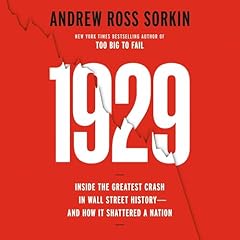
The Forgotten Depression
1921: The Crash That Cured Itself
No se pudo agregar al carrito
Add to Cart failed.
Error al Agregar a Lista de Deseos.
Error al eliminar de la lista de deseos.
Error al añadir a tu biblioteca
Error al seguir el podcast
Error al dejar de seguir el podcast
 Exclusivo para miembros Prime: ¿Nuevo en Audible? Obtén 2 audiolibros gratis con tu prueba.
Exclusivo para miembros Prime: ¿Nuevo en Audible? Obtén 2 audiolibros gratis con tu prueba.Compra ahora por $20.56
-
Narrado por:
-
Rick Adamson
-
De:
-
James Grant
James Grant's story of America's last governmentally untreated depression: A bible for conservative economists, this "carefully researched history... makes difficult economic concepts easy to understand, and it deftly mixes major events with interesting vignettes" (The Wall Street Journal).
In 1920-1921, Woodrow Wilson and Warren G. Harding met a deep economic slump by seeming to ignore it, implementing policies that most 21st-century economists would call backward. Confronted with plunging prices, wages, and employment, the government balanced the budget and, through the Federal Reserve, raised interest rates. No "stimulus" was administered, and a powerful, job-filled recovery was under way by late 1921. Yet by 1929, the economy spiraled downward as the Hoover administration adopted the policies that Wilson and Harding had declined to put in place.
©2014 James Grant (P)2019 TantorLos oyentes también disfrutaron:




















Las personas que vieron esto también vieron:




Great for history buffs!
Se ha producido un error. Vuelve a intentarlo dentro de unos minutos.
Best thinking-sharpener I know of
Se ha producido un error. Vuelve a intentarlo dentro de unos minutos.
This book explains quite well, why deflation is not a monster that people make it out to be. When an economy makes too much of one thing, the over production must go on Sale (aka Liquidated). On sale is not bad, all prices go down. So instead of people losing their job, they can work for a lower wage and buy goods sold at a lower price. That is a natural and low government intensity approach.
If you are familiar with the "Forgotten Man" book by Amity Schales, then you will understand this book even better, but you don't need to read Amity first. It just shows the origins and over-reaction of the Hoover presidency. When the government does too much, it makes people expect a bail out and makes depressions worse. The natural brakes on over-production is the risk of being stuck with bad debt, self management.
Must Know Economic History
Se ha producido un error. Vuelve a intentarlo dentro de unos minutos.
historic
Se ha producido un error. Vuelve a intentarlo dentro de unos minutos.
It is not the thesis that is unsatisfying but his proof is lacking only because it’s basis is to prove that any form of government intervention is disastrous. The book almost teeters on the edge of being a conspiracy theory rather than a historical work.
My intention in writing this review, is not to admonish the thesis but to share with you the book lacks a factual and theoretical foundation to provide its thesis. Maybe I am overwrought with ALT-everything but, I felt it was like political target practice rather a critical work of historical merit.
Scoring Political Points
Se ha producido un error. Vuelve a intentarlo dentro de unos minutos.


